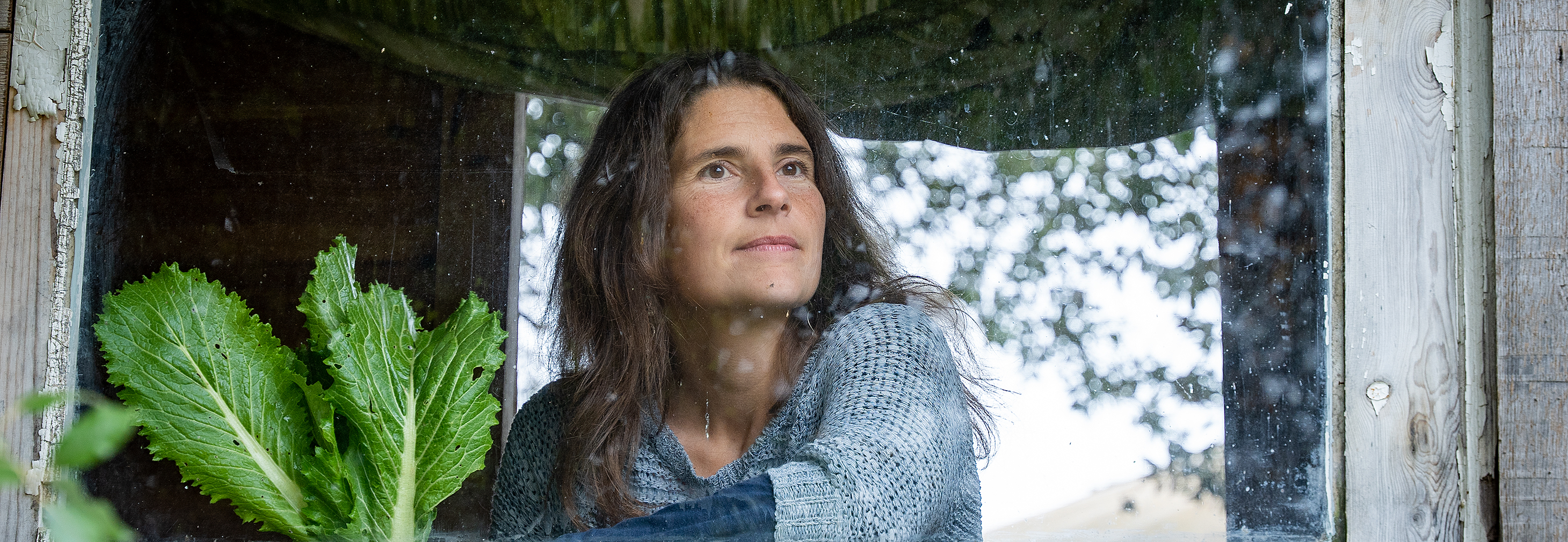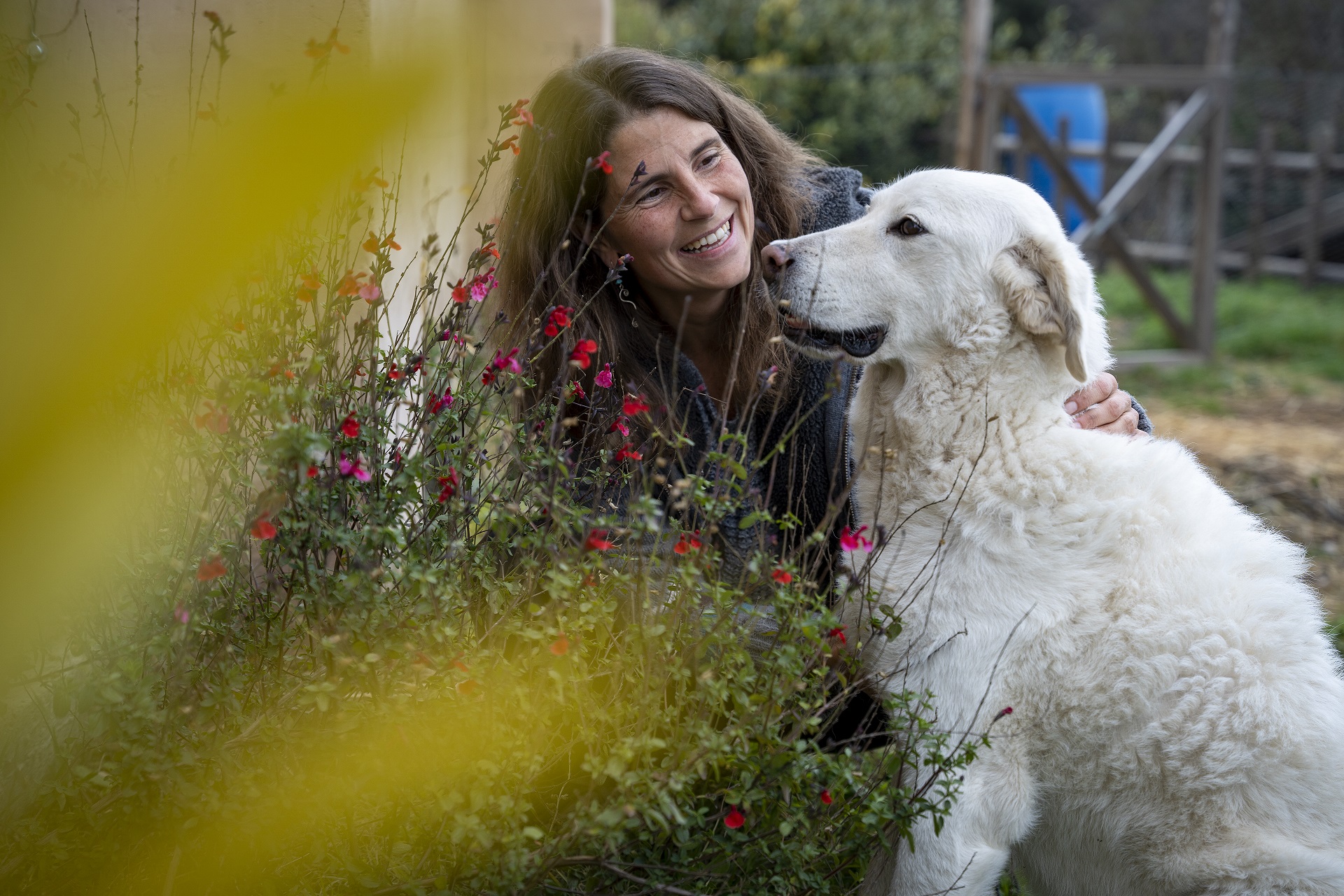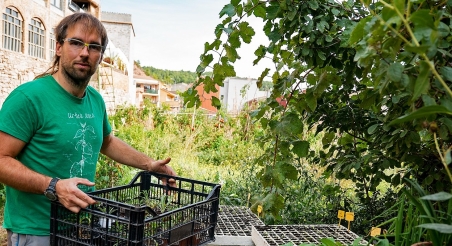A path between holm oaks leads to Mas Les Vinyes, a farm in Sant Martí d’Albars that’s home to a community living project undertaken by three families. It’s the shared dream of six adults and three teenagers aged between 12 and 15 years old, who together manage the farm’s 25 hectares of land, livestock and beautiful 1,000 m2 farmhouse as a work cooperative. The project is spearheaded by psychology graduate Ariadna Tremoleda, multimedia engineer Sergi Caballero and renewable energy specialist Robert Fontan. Between them, they run a working and educational laboratory that aims to help transform local agriculture and livestock farming.
The project came into being in 2013 as a result of this group of people’s desire to promote the health of the earth under their feet and the beings that inhabit it. Since then, they’ve followed the criteria of permaculture and regenerative agriculture. In addition to regularly providing training activities at the farm for students, they host volunteers of the European Erasmus Plus project. Robert shows us the livestock he takes care of every day and we get to know Ariadna properly as she takes us on an exhaustive tour of the project. In our conversation, she paints a better future in which the observation of nature and degrowth are two key strategies for adapting to climate change.
Permaculture as a tool for transformation
When you enter Mas Les Vinyes, you can’t help but be enthused by the many surprises that the farm has in store. Strictly designed according to permaculture criteria, nothing is here by chance; as in nature, every element has a specific function. From the edible forest to the mobile chicken coop, the water purification ponds, the vermicompost area, the self-build cabin or the friendly carnivorous ducks, the entire farm has been thought out and designed with the goal of mitigating the climate emergency, while also serving as a food production and educational facility. Ariadna Tremoleda (Barcelona, 1982) describes the basis of the project thus: “As a group, we’ve decided to run the farm together, which enables us to be efficient on several levels.”
The guiding idea of the initiative is permaculture, “a system for the design of human habitats that should generate more energy than its functioning requires,” explains Ariadna. They’re passionate about this approach at Mas Les Vinyes: not only do they run the farm according to permaculture practices, but also they share them with all the students who visit this nature classroom every year as part of the International Permaculture Design Course. Educational training is the core activity of the project, but it also encompasses food production (vegetables, fruit, eggs, chicken and lamb) and the provision of consultancy services to other farms. As complementary activities, the farm collaborates with the Central Catalonia Cooperative Association and the Chair for the Rural World of the University of Vic – Central University of Catalonia.
The origins of a shared dream
But what was the lightbulb moment that made it possible to turn the dream of Mas Les Vinyes into reality? Ariadna can pinpoint it exactly. Originally from Barcelona, after completing her studies, she spent some time in Granada and Sabadell, doing various jobs. In her younger years, she was heavily involved in feminist social movements. She was particularly concerned about the right to housing, but she always adopted an extremely “anti” attitude; that is, always focusing on what she was opposed to. In 2006, when she and Sergi were expecting their first child, she had a crisis: “I wasn’t comfortable with the classic family set-up of father, mother and child, or about bringing our child up in the city.” Moreover, she went through a phenomenon that’s fairly common during pregnancy: she had an urge to create rather than destroy. “I yearned to create the world that I wanted for my children and for the future of the planet,” she explains. It was that need that sparked her dream for a life within a community and in contact with nature. Together with some families that were carrying out personal growth training, they created a group in order to try to ground this idea and turn it into reality.
Now she and Sergi have two children, Nael and Ainara. In 2007, when the little one was just a few months old, they upped sticks and left the city for the countryside, moving around Montseny and Garrotxa before finally arriving at Mas Les Vinyes in 2013. Having been granted a mortgage, four people agreed to buy the farm and embark on the project. “We made it a condition to be an hour and a half away at the most from our family in Barcelona. Given that one of the guys who partnered with us to buy the farm worked in Berguedà and our kids went to school in Vic, this place was halfway between the two locations,” she explains. They thought that the area was pretty and fertile, and although they couldn’t locate any water source on the farm that was free of the nitrates generated by the meat industry, they decided to turn the problem into an opportunity. “We had to pay scrupulous attention to the water supply process,” says Ariadna.
Water and energy, assets to be preserved
If we had to sum up Mas Les Vinyes in a colour, it would be the green of chlorophyll: every tone of green is on display on the farm, generating a sensation of abundance. Although it’s winter, when nature rests, Ariadna heads into a field of intense green mustard plants. Mustard is a highly prized plant on the farm, since it has strong roots that break up the subsoil, while also being a good natural fertiliser. “We always try to ensure that everything has more than one function,” she says.
In order to sustain the vegetable garden, the edible forest of fruit trees and the project as a whole, they obviously need water, which they accumulate and retain in the soil through the so-called Keyline system. “As opposed to what occurs in industrial farming, we wish to retain the water that falls on the farm,” explains Ariadna. They also collect rainwater and use specific aquatic plants in order to remove waste from the water. Since water is such a highly prized resource, they make sure it can be reused as much as possible.
Ariadna and her colleagues constantly monitor climate change, one of the biggest challenges they face. “Climate patterns are changing: it’s not that it’s raining less, but rather that rain has become irregular,” she says, although she acknowledges the worsening of the drought problem in the last two years. To mitigate its effects, they’ve devised a system to collect rainwater from roofs and have a 280,000-litre tank. “The amount of water collected by this farm alone amounts to half the water collected by the entire city of Barcelona,” she explains, pointing out that the capital city boasts just two tanks like the one they have on the farm. In addition to dry toilets, they’ve built four water purification ponds where they process grey water, which, once purified, is used to irrigate the fruit trees.
Another extremely important aspect of the project is that it has been designed to close cycles. On the farm they try to ensure that there are no energy losses and to depend as little as possible on external energy. As such, not only do they produce and store energy, but also they strive to ensure maximum efficiency in all their designs. The farm’s reuse strategy also encompasses its soils, which are covered to improve their properties, and a special combination of tree, shrub and plant species. As an aside, they point out that they grind and roast the eggshells of their hens in order to provide their chickens with calcium.
Forest management, a crucial tool to combat climate change
It takes a whole day to complete an exhaustive tour of Mas Les Vinyes, preferably with a notebook in hand, because it’s divided into specific zones: zone 0 is where the community lives; zone 1 houses the main vegetable gardens and the small livestock; zone 2 is home to the large livestock and fruit trees; zone 3 is where the largest trees are located; zone 4 is where mushrooms and plants are picked, and where stones are collected; lastly, zone 5 is a purely observational area where nothing is touched. Each zone is attractive in its own way and, depending on the time of year, the farm feels more like a biodiversity reserve than a working and educational farm.
“Permaculture involves observing natural patterns and designing on the basis of these models. Conversely, conventional agriculture seems to be fighting against nature,” explains Ariadna. For instance, we all know that if a field is left uncultivated, it tends to turn into a forest. With this in mind, at Mas Les Vinyes they thought about what kind of forest they wanted to have and, in order to achieve it, they planted an edible forest. They apply the same principles to fauna: first they put sheep out, followed by chickens, which eat the larvae laid by flies in the sheep excrement. In the environment created by this process, there’s no shortage of bees for pollination purposes. “It’s all about closing cycles,” states Ariadna.
«Permaculture involves observing natural patterns and designing on the basis of these models. Conversely, conventional agriculture seems to be fighting against nature» Ariadna Tremoleda
They also obtain 12 tons of firewood from the forest on the farm. It’s mainly pine wood, since they observed that this species is affected more by disease outbreaks and is more vulnerable than oaks and holm oaks to the effects of climate change. The wood is used as fuel for the farm’s heating system and for the inverted flame wood boiler, which can heat up to 2,000 litres of water. Meanwhile, the sawdust is added to the compost in order to enrich it with carbon. Furthermore, by burning pine in the boiler rather than holm oak or oak, they help the forest to better adapt to the challenges posed by the climate emergency.
Another forest management practice used at Mas Les Vinyes is related to the grazing of its flock of sheep. The silvopasture system for small livestock helps to maintain the fire protection areas in good condition. Furthermore, rotational grazing allows the animals to take advantage of the nutritional richness of the plant varieties that grow in the forest while preventing them from eating too much in one place.
The joy of living in a community
Community living involves a strong element of sustainability. “It’s brilliant,” enthuses Ariadna. The home group provides emotional and physical sustainability, as well as facilitating family logistics. They possess a collective washing machine but no fridge, which they say they don’t need. They find it more exciting to enter their collective pantry and see what food is stored there.
«Living in a community is brilliant» Ariadna Tremoleda
When you meet Ariadna, you realise that food is a link in the chain that enables us to renew ourselves as human beings, to educate ourselves and to take responsibility for our physical, mental and emotional wellbeing. All she needs is a childhood memory to reaffirm her conviction that changes are possible. She, like so many other city dwellers, had eaten frozen vegetables all her life. But one day she tasted organic peas and spinach (“Living spinach leaves and peas from the pod,” she specifies) and suddenly asked herself in wonderment if the food she had been eating was really spinach and peas. She could hardly have imagined that one day in the not-too-distant future she’d become a farmer of organic vegetables.
Much of the work carried out at Mas Les Vinyes is related to degrowth; that is, learning how to differentiate between people’s real needs and those imposed by the market. This research is of great help when it comes to avoiding waste, such as packaging used for processed food.
Ariadna is a strong woman, an authentic source of energy and information. Nevertheless, she feels even more powerful with her family, cooperative and community. When asked about the role played by women in the primary sector, she’s unequivocal: “We want to play every single role. Actually, I think that what we need to recover is the feminine side of all people,” she concludes.
Responsibility and freedom often go hand in hand, and she experiences a greater sense of freedom now that she feels part of nature: “In this new life that I have, I take greater care of my cycles. That gives me so much freedom, much closer contact with my body, much more self-respect.” She sees the future as one of permaculture and feminism: “I want a future that’s about taking responsibility, looking after each other, respecting nature, feeling part of the environment we inhabit.”
«I want a future that’s about taking responsibility, looking after each other, respecting nature, feeling part of the environment we inhabit» Ariadna Tremoleda
Challenges kept in check
The consequences of the climate emergency or the lack of water are problematic and generate uncertainty for the residents of Mas Les Vinyes. “We’re already taking responsibility for it, but we need to keep working in order to adapt to the changes that will come due to the scarcity of energy,” warns Ariadna.
Faced with the crises that may come, biodiversity promises to be one of the strengths of the farm and one of the strategies that should improve its resilience. The cooperative’s three areas of activity and its special emphasis on education are also aimed at increasing economic sustainability. However, its members find it difficult to get public bodies to understand their holistic vocation. “For example, in the case of the Government of Catalonia, if you address the Agriculture and Livestock departments at the same time, they don’t get it,” Ariadna complains. Meanwhile, when it comes to obtaining funding for farming production, the authorities don’t grasp the fact that the farm might have four hundred types of fruit, instead assuming that they’ll have just one or two.
“We’re incapable of making the public authorities understand that some projects are systemic and involve more than one activity,” she explains. To try to change this mindset, the farm has joined the Central Catalonia Cooperative Association and takes part in other groups. Nevertheless, as things stand, Mas Les Vinyes is not officially classified as an agricultural production facility; although it is one, the public authorities consider that it fails to meet the minimum income threshold. Another stumbling block is that they still haven’t been able to obtain authorisation to operate as a farm school. When they initiated the procedure, they discovered that they were obliged to have an enclosed space with air conditioning. This legal requirement went against the principles of their project and their commitment to combating climate change, so they gave up on it.
An optimistic outlook
Despite all the challenges, they remain optimistic and continue to devise ways of turning their current problems into opportunities. When they think about the incorporation of new members in the primary sector, they’re unequivocal about the need to support people who, like themselves, don’t come from farming stock. To do so, they consider that the first step should be to facilitate access to land. They’re very much in favour of initiatives such as the Land Bank of Montserrat Rural Park and other options offered by private entities, providing that they involve “measures aimed at dignifying the sector” and include “assistance in administrative and bureaucratic matters,” says Ariadna. In respect of land banks, this new farmer is of the opinion that the agricultural business incubators rolled out as part of the BCN Smart Rural strategy are powerful tools, since they give young people the chance to try out farming before committing to it for five years, which is a requirement in order to obtain the start-up funding for new young farmers offered by the Government of Catalonia. Other actions that inspire Ariadna are the French Farmer’s Statute or farming contracts. A long list of tools and proposals emanate from Mas Les Vinyes, which is much more than a permaculture community: it’s a laboratory of ideas and practices that are constantly evolving.
— BCN Smart Rural Editorial —




